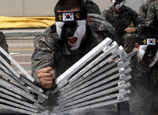
BEIJING, June 14 (Xinhuanet) - In the past years, the U.S. Government has been blaming other countries for threatening cyber security. However, the recent leakage of the two top-secret U.S. surveillance programs of the National Security Agency (NSA) has smashed the image of the U.S. as a cyber liberty advocate and revealed its hypocrisy.
Edward Snowden, a 29-year-old defense contractor, revealed last week that the NSA is monitoring a wide swath of telephone and Internet activity as part of its counterterrorism efforts.
Snowden told the South China Morning Post in Hong Kong Wednesday that the United States is involved in extensive hacking operations directed against China.
In an interview with the newspaper, Snowden said he wanted to demonstrate “the hypocrisy of the U.S. government when it claims that it does not target civilian infrastructure, unlike its adversaries.”
“We hack network backbones -- like huge Internet routers, basically -- that give us access to the communications of hundreds of thousands of computers without having to hack every single one,” he said.
"Not only does it do so, but it is so afraid of this being known that it is willing to use any means, such as diplomatic intimidation, to prevent this information becoming public."
The revelations have renewed the debate over surveillance in the United States and overseas under the pretext of fighting terrorism. Civil liberties advocates describe the measures as “dangerous and unacceptable intrusions.”
“Americans’ faith in the law is touching. In this instance, it is misplaced,” read an article posted on the New Yorker on Wednesday.
“Ever since 9/11 and the USA Patriot Act and the explosion of new security organizations, the American people have seen their liberties eroded.” said Bob Beckel, a liberal Democratic strategist. And Cal Thomas, a USA Today’s columnist, shared Beckel’s opinion when they discussed the impact of the leaks on citizens' liberty in his Wednesday’s column.
U.S. officials have argued the programs strike the correct balance between privacy and national security. Obama administration have attempted to justify the surveillance programs by pointing to the arrests and convictions of would-be New York subway bomber Najibullah Zazi in 2009 and David Headley, who is serving a 35-year prison sentence for his role in the 2008 Mumbai attacks.
However, court documents lodged in the U.S. and UK, as well as interviews with involved parties, suggest that data-mining through Prism and other NSA programs played a relatively minor role in the interception of the two plots, according to a report of the Guardian.
The New York Times also criticized that the U.S. government is “using a would-be subway bomber to justify sweeping surveillance.”
While the U.S. government is defending its own surveillance programs, it keeps accusing other countries including China of launching cyber attacks.
For months now, the U.S. government has implicated Beijing in state-sponsored hacking. China has denied such attacks while defending itself as a victim of cyber crimes. Snowden’s testimony now certainly adds a dose of conviction to the Chinese government’s statements.
According to the whistleblower, among some 61,000 reported targets of the NSA are thousands of computers in China -- which U.S. officials have increasingly criticized as the source of thousands of attacks on U.S. military and commercial networks.
China's cyber security has come under increasingly severe threats amid a variety of safety risks, according to a report released in March by the National Computer Network Emergency Response Technical Team Coordination Center (CNCERT).
Hackers have tampered with 16,388 web pages in China -- including 1,802 government websites -- in the past year, up 6.1 percent and 21.4 percent year on year respectively, the report said.
In 2012, around 73,000 overseas Internet Protocol addresses were involved in hijacking nearly 14.2 million mainframes in China via Trojan or Botnet, with the United States being the largest source of such hacking activities.
As the birthplace of the World Wide Web, the United States already has a matchless superiority and ability to launch cyber attacks around the globe.
Currently, the U.S. military has established a significant cyber force, including the 780th Military Intelligence Brigade, which is a regular military unit tasked with carrying out cyber missions.
Earlier media reports said Iran was once attacked by U.S. military intelligence agencies via the Internet, while, according to China's foreign ministry, a majority of the cyber attacks against China comes from the United States.
As the aftershocks of NSA surveillance programs continue, it’s time for the U.S. government to make more self-examination instead of pointing fingers at other nations.
















 Developer razes historic Guangzhou structures
Developer razes historic Guangzhou structures


![]()
